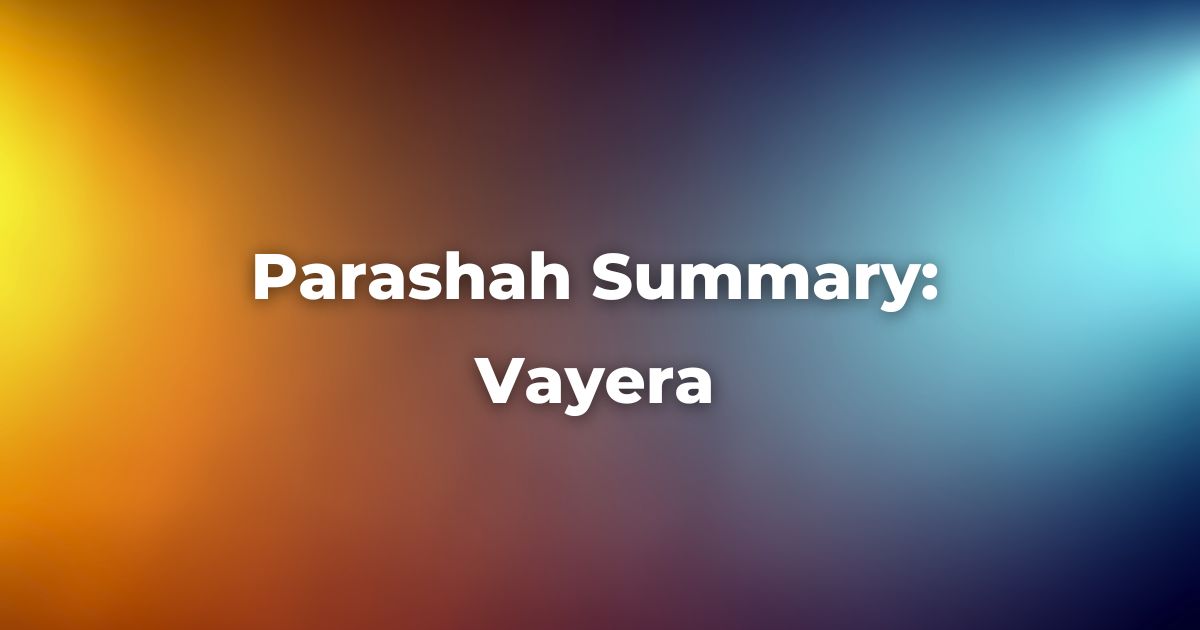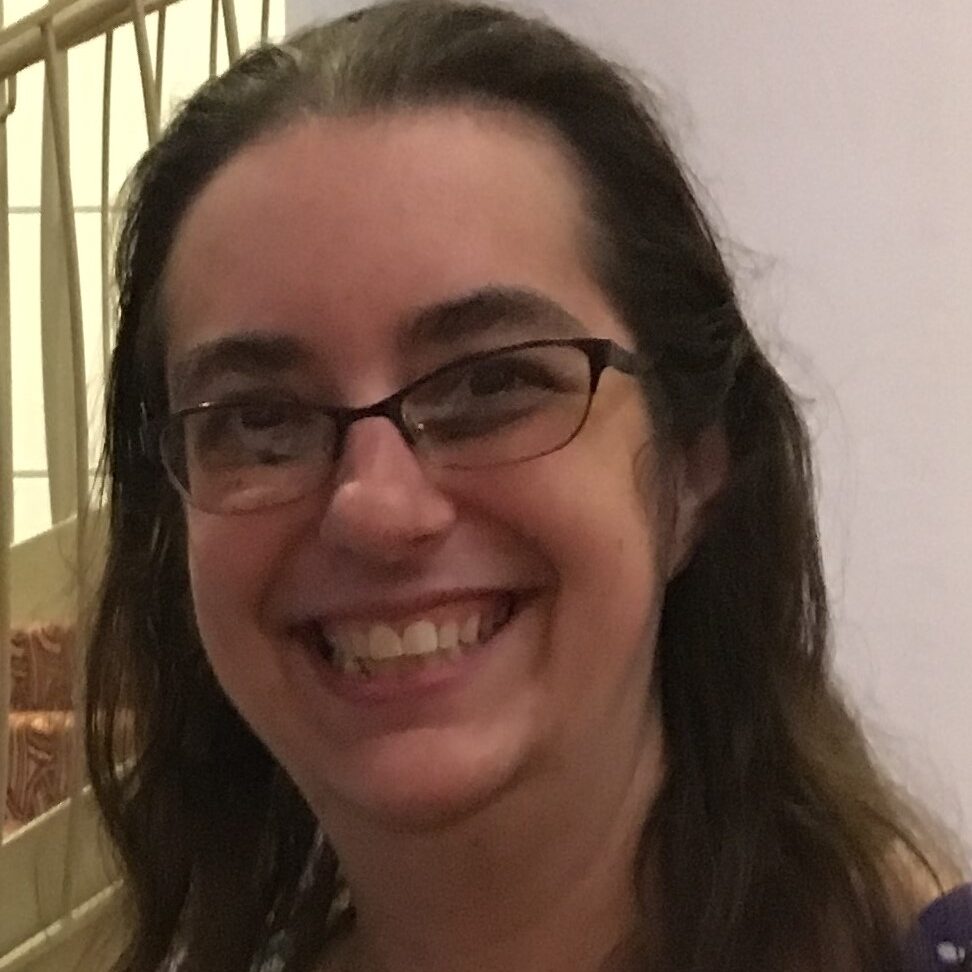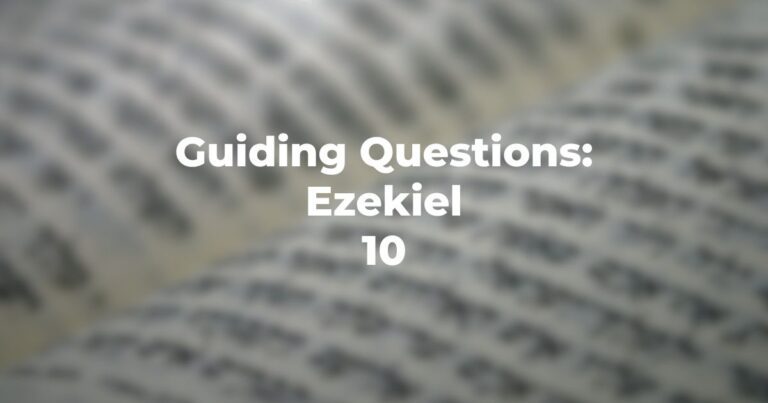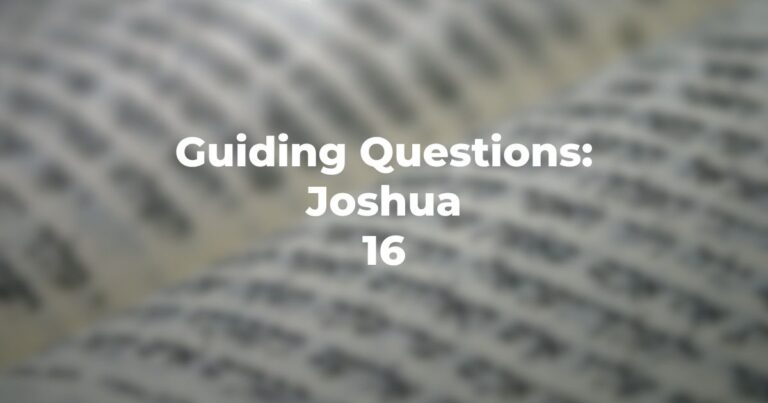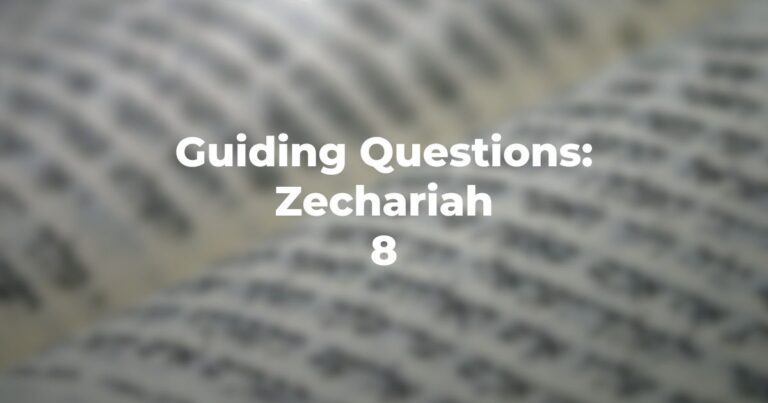Summary
Abraham welcomes guests who promise that Sarah will have a baby that year. Despite Abraham’s attempts to save the cities, God destroys Sodom and Gomorrah. Lot’s family escapes thanks to angelic intervention, but his wife turns into a pillar of salt for looking back. Lot’s daughters sleep with him. God remembers the promise to Abraham, and Sarah gives birth to Isaac. Based on what she sees at Isaac’s weaning party, Sarah sends Hagar and Ishmael out into the desert, where God ensures they survive. God tells Abraham to sacrifice Isaac and he is set to do so when stopped by an angel. Instead, he sacrifices a ram whose horns were caught in a nearby bush.
Aliyah-by-Aliyah Summary
1st Aliyah: Genesis 18:1-14
Abraham is sitting at the entrance to his tent and notices three men approaching from the distance. He mobilizes his household to quickly prepare a meal for the guests. The three men tell Abraham he and Sarah will have a son that year. Sarah overhears and laughs because they are so old, but denies laughing when asked directly about it.
2nd Aliyah: Genesis 18:15-33
The men set off toward Sodom. God says that Sodom and Gomorrah will be destroyed because they are so sinful, and Abraham argues with God that it is not right to punish the innocent with the guilty. God and Abraham enter a negotiation, and God ultimately agrees to spare the cities if they contain a minimum of ten good men.
3rd Aliyah: Genesis 19:1-20
Two angels go to Lot in Sodom, and he offers them hospitality. The people of Sodom surround Lot’s house and demand that the guests be brought out so they can rape them. Lot refuses to bring out the guests but offers up his daughters in their place. Lot is pulled back into his house, and a blinding light strikes the people of Sodom. The angels urge Lot to take his family and flee Sodom before God destroys it.
4th Aliyah: Genesis 19:21-21:4
Lot flees to the nearby town of Zoar, and God destroys Sodom and Gomorrah. Despite having been told not to, Lot’s wife looks back and turns into a pillar of salt. Lot flees with his daughters into the hills, and they take turns getting him drunk and sleeping with him. Both girls give birth to sons fathered by their father.
Abraham moves to a new region, and as he did before with Pharoah, lies to the local king that Sarah is his sister, to protect himself. God protects Sarah, and King Abimelech confronts Abraham regarding his deception. Abraham explains his reasoning and is given a reward. God remembers Sarah, and she conceives and births a son, named Isaac. Isaac is circumcised when he is eight days old.
5th Aliyah: Genesis 21:5-21
When Isaac is born, Abraham is 100 years old. When Isaac is weaned, Abraham holds a great feast. Sarah does not like the interactions she sees between Ishmael and Isaac, so she demands that Hagar and Ishmael be cast out into the desert. Abraham gives them bread and water, but Hagar despairs when the water runs out. God hears Ishmael’s cries and reveals a well of water to Hagar. God is with Ishmael as he grows up, and he marries an Egyptian.
6th Aliyah: Genesis 21:22-34
King Abimelech tells Abraham that since God deals fairly with Abraham, he will do the same. After a conflict regarding wells, Abraham and King Abimelech make a pact. The pact includes seven ewes and a well which inspires the name of location, Beer Sheva. Abraham dwells in the land for many years.
7th Aliyah: Genesis 22:1-24
God tells Abraham to take Isaac to Moriah and offer him as a sacrifice. Abraham sets out to do as God commands, and when they are alone ascending the hill, Isaac asks where the sacrifice is. They arrive at God has chosen location, and Abraham binds Isaac on the altar. When Abraham picks up the knife to kill Isaac, an angel calls his name and tells him not to hurt Isaac. Abraham sees a ram and sacrifices that instead. God promises to bestow blessings on him and make his descendants as numerous as the stars. (Maftir: Genesis 22:20-24) Abraham is informed of the nephews born to his brother, Nahor, and his wife, Milchah.
Triennial Breakdown
Note: For more information about the tradition of spreading the TorahRefers to the first five books of the Hebrew Bible, the Tanakh, also called the Five Books of Moses, Pentateuch or the Hebrew equivalent, Humash. This is also called the Written Torah. The term may also refer to teachings that expound on Jewish tradition. Read more readings over a 3-year cycle see here.
| Aliyah | Year 1: 18:1-18:33 | Year 2: 19:1-20:18 | Year 3: 21:1-22:24 |
|---|---|---|---|
| 1 | 18:1-18:5 | 19:1-19:11 | 21:1-21:4 |
| 2 | 18:6-18:8 | 19:12-19:20 | 21:5-21:13 |
| 3 | 18:9-18:14 | 19:21-19:29 | 21:14-21:21 |
| 4 | 18:15-18:21 | 19:30-19:38 | 21:22-21:34 |
| 5 | 18:22-18:26 | 20:1-20:8 | 22:1-22:8 |
| 6 | 18:27-18:30 | 20:9-20:14 | 22:9-22:19 |
| 7 | 18:31-18:33 | 20:15-20:18 | 22:20-22:24 |
| Maftir | 18:31-18:33 | 20:15-20:18 | 22:20-22:24 |
Triennial Summaries
Year 1: See Aliyot 1 and 2
Year 2: See Aliyot 3 and 4
Year 3: See Aliyot 4-7
Haftarah Summary
Haftarah: 2 Kings 4:1-37 (Ashkenazim) or 2 Kings 4:1-23 (Sephardim)
A woman who believes a creditor is coming to take her sons begs Elisha for help. He tells her to borrow as many empty vessels as she can, and pour oil into each of them. She does so until they are all full, then sells the oil to pay the debt. A Shunamite woman offers Elisha hospitality every time he passes by, and even builds him his own room. To thank her, noticing that she has no children, Elisha promises that she will give birth to a son that year. One day, the child dies in his mother’s arms. She lays him on Elisha’s bed, and goes to find him. Elisha comes back to her house and revives her son.
See our Haftarah breakdown here.
Author
-

Rabbi Suzanne Brody is a passionate Jewish educator, writer, reader, and crochet enthusiast. She is the Director of Ithaca Beit MidrashLiterally, “house of study,” it refers to a school or a communal study hall. Plural: Batei Midrash Read more (www.ithacabeitmidrash.com) and hopes you’ll join her for a class or two! Rabbi Brody is also the author of multiple books of poetry and fiction (available on Amazon). When she is not at her computer or by the lake writing, Suzanne can be found teaching in both formal and informal Jewish educational settings or enjoying time with her husband, their two teens, and cuddling with their dogs and cats.
View all posts https://www.amazon.com/s?k=suzanne+brody&crid=20HPAG70405E9&sprefix=suzanne+brody%2Caps%2C207&ref=nb_sb_noss_1

